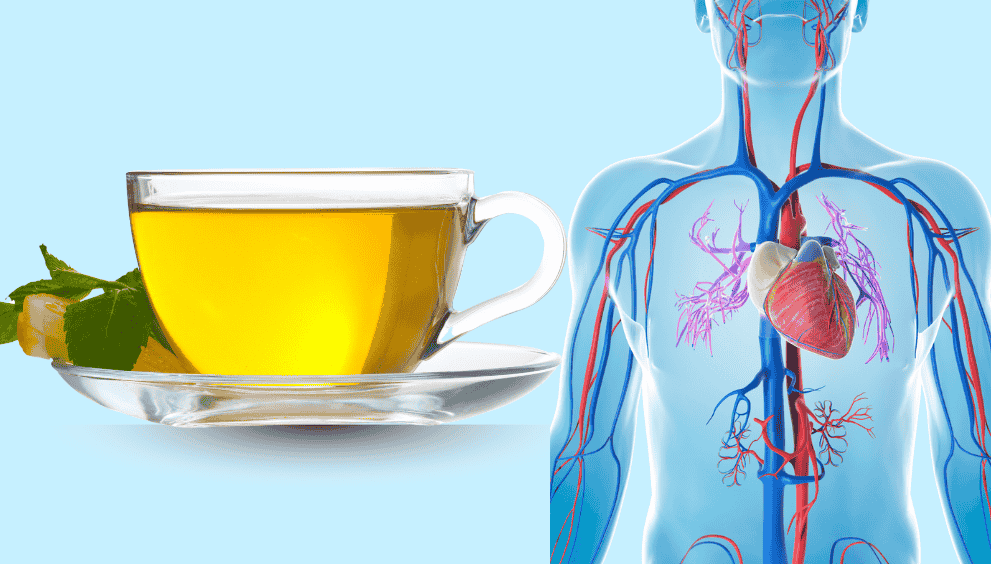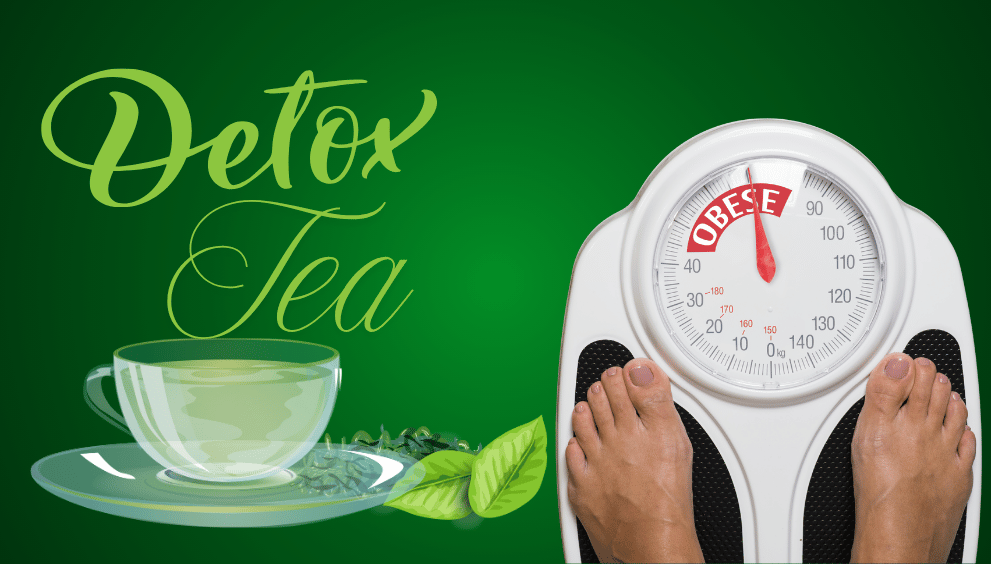What Is a Detox Tea? Benefits, Risks & How It Works
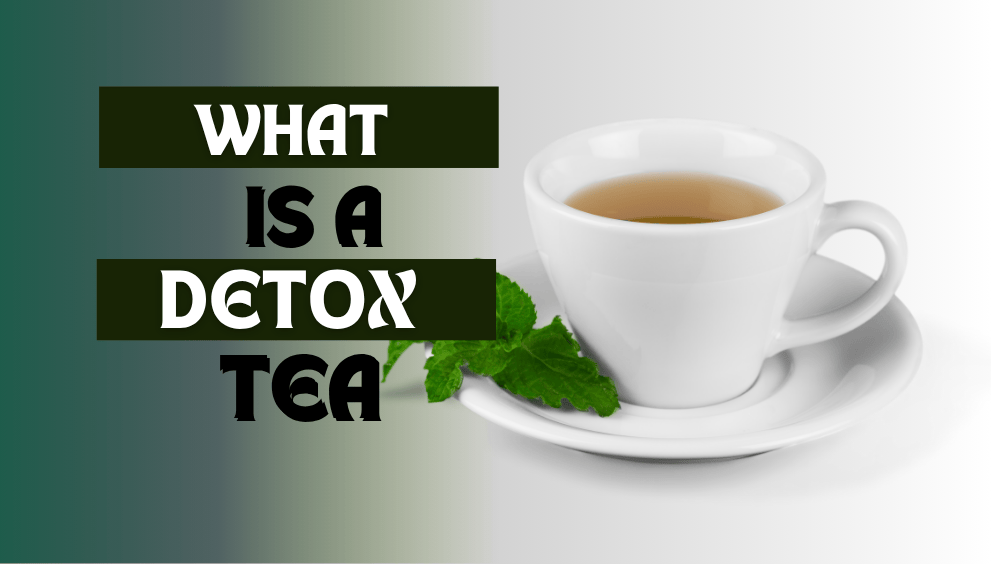
What is a detox tea? Learn about the function of detox teas, their benefits and risks, and whether they can support weight loss or provide only temporary results. Detox teas are ubiquitous, available in grocery stores, on social media, and in the routines of influencers. They promise to remove toxins, reduce bloating, and help you feel physically fit and healthier. The actual question is, what is a detox tea exactly, and do these claims hold up?
Are detox teas a true wellness essential, or just another trend fueled by clever marketing? In this article, we’ll discover what detox tea is, how it works, and whether it delivers on its bold promises. Backed by science and explained in simple terms, this guide will help you decide if detox tea belongs in your cup or the trash.
1. What Is a Detox Tea?
A detox tea is a blend of herbs and natural ingredients prepared to help the body eliminate toxins, support digestion, and promote a feeling of lightness or cleansing. Unlike regular teas, such as black or green tea, detox teas often contain a combination of ingredients that act as natural diuretics, mild laxatives, or digestive aids.
Common Ingredients in Detox Teas Include:
- Dandelion root supports liver functions and acts as a gentle diuretic.
- Ginger can reduce inflammation and soothe the digestive system.
- Senna – a natural laxative that maintains bowel movements
- Green tea contains antioxidants and caffeine to support metabolism.
- Peppermint or fennel – helps reduce bloating and gas.
- Lemon or turmeric may support detox and immune health.
How Detox Tea Differs from Regular or Herbal Tea:
- Regular teas (like green, black, or oolong) are prepared from the Camellia sinensis plant and offer benefits like caffeine and antioxidants.
- Herbal teas are made from flowers, herbs, and spices, often used for calming or soothing purposes.
- Detox teas, however, are formulated specifically to “cleanse” the body, combining herbal and medicinal ingredients that aim to flush out waste, improve digestion, and sometimes aid in weight loss.
In short, detox tea is more than a casual beverage — it’s marketed as a functional drink, but not all blends are created equal or safe for daily use.
2. What Does Detox Tea Claim to Do?
If you’ve ever read the label on a detox tea box or scrolled through a wellness ad, you’ve likely seen big promises. Detox tea brands often market their products as natural solutions for flushing out toxins, weight loss, and improving overall health, all with just one or two cups a day.
Here are the most common claims made by detox tea companies:
1. Remove Toxins
Detox teas often say they help the body “cleanse” itself by removing toxins through the liver, kidneys, or digestive system. While your body already has organs designed for this purpose, some ingredients, such as dandelion or milk thistle, are believed to support liver function.
2. Aid Digestion
Many detox teas include herbs such as ginger, fennel, or peppermint, which are known to soothe the stomach, reduce gas, and ease digestion. Some also include laxatives, such as senna, which stimulate bowel movements and may provide temporary relief from constipation.
3. Reduce Bloating
By promoting urination or bowel movements, detox teas can make you feel less bloated. Ingredients like dandelion and lemon are often marketed as gentle ways to “de-puff” the body and flatten the stomach, though the effects are usually temporary.
4. Boost Weight Loss
Weight loss is one of the most significant selling points. Detox teas are often advertised as fat-burning or metabolism-boosting, thanks to ingredients like green tea, caffeine, or laxatives. However, most of the initial weight loss is water weight, not fat loss.
While these claims can be appealing, it’s essential to understand that not all are backed by strong scientific evidence, and results can vary widely depending on the tea, your body, and how it’s used.
3. How Detox Tea Works (According to Science)
Detox teas often contain a mix of herbs and natural ingredients that claim to support your body’s detoxification process. But how do they work — and which claims are science-based vs. marketing buzzwords? Let’s break it down.
How the Ingredients Affect the Body
A. Digestion:
Ginger, peppermint, and fennel can help boost stomach performance, reduce gas, and accelerate digestion. Mild laxatives like senna stimulate bowel movements, which may lead to a short-term feeling of “cleansing.”
B. Liver support:
Dandelion root and milk thistle are believed to support liver function, which has a vital role in filtering toxins from the bloodstream. However, researchers are working on these herbs, and the effects can vary.
C. Kidney support:
Some detox teas contain mild diuretic herbs, such as parsley or dandelion, which increase urination and may help flush excess water or sodium. However, this doesn’t mean they’re removing harmful toxins in a clinically proven way.
What’s Fact vs. What’s Marketing
Science-based:
- Certain herbs may help ease digestion, reduce water retention, or promote regular bowel movements.
- Ingredients like green tea (with caffeine and catechins) can slightly boost metabolism.
Marketing hype:
- Claims that detox teas “cleanse your body of toxins” are vague and unproven.
- Nature blesses the body with a natural detox system already—your liver, kidneys, lungs, and skin handle this process daily without the need for external assistance, such as tea.
Short-Term vs. Long-Term Effects
- Short-term effects may include reduced bloating, more frequent bowel movements, or temporary weight loss (mostly water weight).
- Long-term effects are less specific. Overuse — especially of teas with laxatives — can lead to dehydration, nutrient loss, or dependency on herbal stimulants.
In summary, detox teas can offer temporary digestive relief or mild support, but they’re not miracle cures. A balanced diet, adequate hydration, and regular sleep remain the most effective long-term methods for detoxification.
4. Types of Detox Teas
- Caffeine-based (e.g., green tea, yerba mate)
- Laxative-based (senna, cascara)
- Gentle herbal blends (peppermint, fennel, lemon balm)
Types of Detox Teas
Not all detox teas are the same. Each blend has a different purpose. Some are energising, others are designed to cleanse your digestive system, and some are intended to promote relaxation. Here’s a breakdown of the most common types:
1. Caffeine-Based Detox Teas
These teas include ingredients like green tea, yerba mate, or oolong tea, which naturally contain caffeine. They are often marketed as metabolism boosters or fat burners.
Common ingredients:
- Green tea – rich in antioxidants (catechins) and gentle caffeine
- Yerba mate may promote energy and fat oxidation.
Purpose: Boost energy, support metabolism, and help with calorie burn.
Note: It is not ideal for nighttime use or for those sensitive to caffeine.
2. Laxative-Based Detox Teas
These blends contain herbs such as senna, cascara sagrada, or rhubarb root, which have natural laxative properties. They are often labelled as “cleanse” or “skinny” teas.
Common ingredients:
- Senna – stimulates the bowels
- Cascara – another herbal laxative
Purpose: Stimulate bowel movements and reduce temporary bloating or constipation.
Warning: It should only be used occasionally — overuse can cause dehydration, dependency, or discomfort.
3. Gentle Herbal Detox Teas
These are caffeine-free, soothing blends meant to support digestion and relaxation without harsh effects.
Common ingredients:
- Peppermint relieves bloating and gas
- Fennel – helps with indigestion.
- Lemon balm promotes relaxation.
- Liquorice root supports the liver.
Purpose: Support the body’s natural detox functions in a calm, non-irritating and relaxing way.
Best for: Nighttime routines or those with sensitive stomachs. Each type of detox tea offers a different experience. Choosing the right one depends on your goals — whether it’s digestion, energy, or gentle support.
5. Benefits of Detox Tea
While detox teas aren’t magic solutions, some blends offer real benefits, especially when paired with healthy habits. Here are a few potential advantages that regular detox tea drinkers may experience:
1. May Relieve Bloating
Many detox teas contain herbs such as peppermint, ginger, or fennel, which can help reduce gas and alleviate abdominal discomfort. These ingredients support smoother digestion and may give you that “flat tummy” feeling, at least temporarily.
2. Supports hydration
Drinking detox tea encourages you to increase your fluid intake, which is essential for digestion, metabolism, and detoxification. Staying hydrated also helps your kidneys naturally flush waste.
3. Could Stimulate Digestion
Some ingredients, such as dandelion root, senna, and lemongrass, gently stimulate the digestive system. This may help with regular bowel movements, which some people interpret as a “cleansing” effect.
4. Encourages Mindfulness and Routine
Taking time each day to brew and sip tea can promote a calming ritual. It also helps you become more aware of your body, cravings, and daily habits, leading to better overall wellness choices.
While results vary from person to person, these benefits can support a balanced lifestyle, mainly when detox tea is used in moderation and not as a quick fix.
6. Risks and Side Effects of Detox Tea
While detox teas may seem like a harmless way to support your health, not all blends are created equal, and some can cause unpleasant or even serious side effects, especially if overused or taken without guidance. Here are the most common risks to be aware of:
1. Cramping or Diarrhea
Teas that contain senna, cascara sagrada, or other natural laxatives can irritate the digestive tract. These ingredients maintain bowel movements, but they can also cause cramping, frequent trips to the bathroom, or loose stools.
2. Dehydration
Frequent urination or diarrhoea from detox teas can result in fluid loss, potentially leading to dehydration. This is especially risky if you’re not drinking enough water alongside your tea.
3. Dependency
Regular use of laxative-based detox teas can cause your body to rely on them for bowel movements. Over time, this can weaken your natural digestive function, leading to chronic constipation when the tea is discontinued.
4. Medication or Health Interactions
Detox teas may interact with certain medications, including blood thinners, diuretics, and medicines used to treat heart and kidney conditions. Ingredients like liquorice root, ginseng, or dandelion may also affect hormone levels or blood pressure.
As a pregnant, breastfeeding, or have any medical condition, you should always talk to a doctor before using detox products.
Use With Caution
- Don’t drink detox tea every day unless it’s specifically labelled safe for long-term use.
- Avoid teas with harsh laxatives unless recommended by a healthcare provider.
- Stay well-hydrated and listen to your body.
7. Who Should Avoid Detox Teas
While detox teas may seem natural and harmless, they’re not suitable for everyone. Specific individuals should avoid them altogether or consult a healthcare provider before use.
1. Pregnant or Breastfeeding Women
Many detox teas contain stimulating herbs or laxatives like senna, which can lead to cramping, dehydration, or even early labour. Some ingredients may also pass through breast milk and affect the baby. Always consult a doctor before using any detox product during pregnancy or breastfeeding.
2. People with Digestive Issues
If you have conditions like IBS (Irritable Bowel Syndrome), Crohn’s disease, or ulcerative colitis, detox teas — especially those with laxatives — may worsen symptoms like diarrhoea, cramping, or inflammation.
3. Those Taking Certain Medications
Detox teas can interact with medications, including:
- Diuretics
- Blood pressure medicine
- Blood thinners
- Diabetes medications
- Hormone therapy
Some herbs can change how your body absorbs or processes these drugs, leading to unexpected side effects.
When in Doubt, Ask Your Doctor
If you’re unsure whether detox tea is safe for you — especially if you’re managing a medical condition or taking daily prescriptions — it’s best to seek professional advice first.
8. How to Use Detox Tea Safely
Detox tea can be a part of a healthy routine — but only if used wisely. Overuse or choosing the wrong blend can lead to discomfort or unwanted side effects. Here are simple tips to help you get the benefits without the risks:
1. Start with Small Amounts
If it’s your first time trying detox tea, begin with a small serving — even half a cup — to see how your body reacts. Everyone’s system is different, especially when it comes to herbs that stimulate digestion.
2. Choose Natural, Gentle Blends
Look for caffeine-free, non-laxative teas with calming herbs like peppermint, chamomile, or ginger. Avoid harsh laxatives, such as senna or cascara, unless your doctor recommends them.
3. Limit use
Detox teas aren’t made for daily, long-term use. Limit your intake to 5–7 consecutive days, then take a break. Long-term use of stimulant teas can lead to dependency or dehydration.
4. Stay Hydrated
Because some detox teas act as diuretics or laxatives, they can increase fluid loss. Drink extra water throughout the day to avoid dehydration and support your body’s natural detox process.
Using detox tea safely means listening to your body and treating it as a short-term supplement, not a daily habit or a weight-loss fix.
9. Best Time to Drink Detox Tea (Without the Risks)
A. Morning: For a Gentle Metabolism Boost
Best Choice: Green tea or light herbal blends (like ginger or dandelion)
Why?
- Green tea’s caffeine and EGCG may slightly increase fat oxidation when paired with physical activity.
- Dandelion tea can support digestion without the need for harsh laxatives.
Warning:
- Avoid senna or laxative teas in the morning, as they can cause frequent and urgent bathroom trips.
- If caffeine-sensitive, opt for caffeine-free herbal teas instead.
B. Night: For Relaxation (If Caffeine-Free)
Chamomile, peppermint, or rooibos tea
Why?
- Calms digestion after dinner.
- Promotes sleep (unlike caffeinated detox teas).
Avoid at Bedtime:
- Laxative teas (such as senna and cascara sagrada) can disrupt sleep with nighttime bathroom trips.
- Caffeinated “detox” blends may cause insomnia.
General Guidelines for Safe Use
- Never drink laxative-based teas at night—stick to mornings (if at all).
- Limit caffeinated detox teas to before 2 PM (to avoid sleep disruption).
- Always hydrate with water—detox teas don’t replace the need for fluids.
How Long Should You Use Detox Tea?
- Max 5–7 days in a row (then take a break).
- Never exceed 1 cup per day (to avoid dependency).
Better Alternatives by Time of Day:
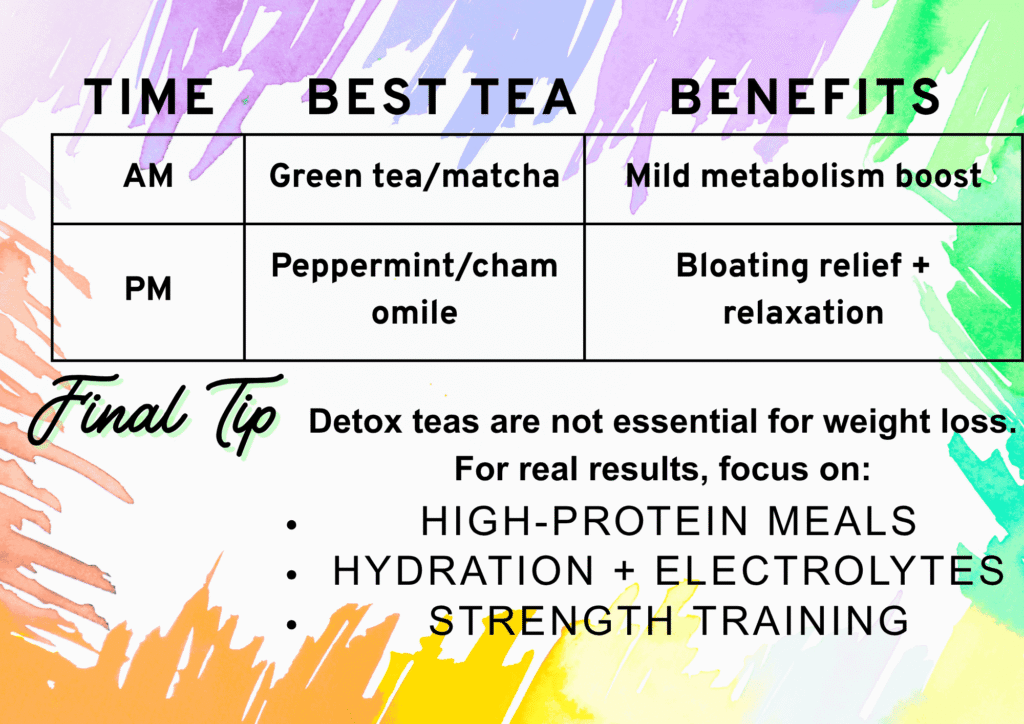
Need a caffeine-free detox tea recipe?
10. Detox Tea vs. Herbal Tea vs. Green Tea
Here’s a clear, concise comparison of these three tea types, focusing on their purpose, ingredients, and best uses:
TABLE
Key Clarifications:
- Detox Tea:
- It often contains harsh laxatives (senna) or diuretics.
- Not for daily use—best as a rare, short-term bloating aid.
- Herbal Tea:
- 100% caffeine-free (not from the tea plant).
- Safe daily (e.g., peppermint for digestion, chamomile for sleep).
- Green Tea:
- Authentic tea (from Camellia sinensis).
- It contains natural caffeine + EGCG for mild fat burning.
- Daily-safe (1–3 cups).
When to Choose Which:
- Want “detox”? Skip detox tea—try dandelion root or ginger tea instead.
- Need energy? Green tea > detox tea (no crash).
- Before bed? Herbal tea (never detox tea with laxatives).
TL;DR: Detox teas are risky shortcuts; herbal and green teas offer safer, long-term benefits.
11. Conclusion: Should You Try Detox Tea
Potential Pros (If Used Carefully):
- Temporary bloating relief (from caffeine-free herbal blends like peppermint or ginger).
- Mild hydration support (if avoiding laxatives and diuretics).
- Placebo effect (may motivate healthier habits in the short term).
Major Cons (Most Products):
- False promises – No fat loss, just water weight.
- Laxative risks – Dependency, dehydration, and gut damage (from senna/aloe).
- Metabolic slowdown: Repeated water-weight cycles can backfire.
Safe Use Guidelines (If You Proceed):
1. Avoid laxative blends (check labels for senna, cascara sagrada, and aloe latex).
2. Limit to 1 cup per day for a maximum of 5–7 days (then take a break).
3. Never replace meals or use them as a “cleanse.”
4. Hydrate extra (add electrolytes to counter diuretics).
Better Long-Term Alternatives:
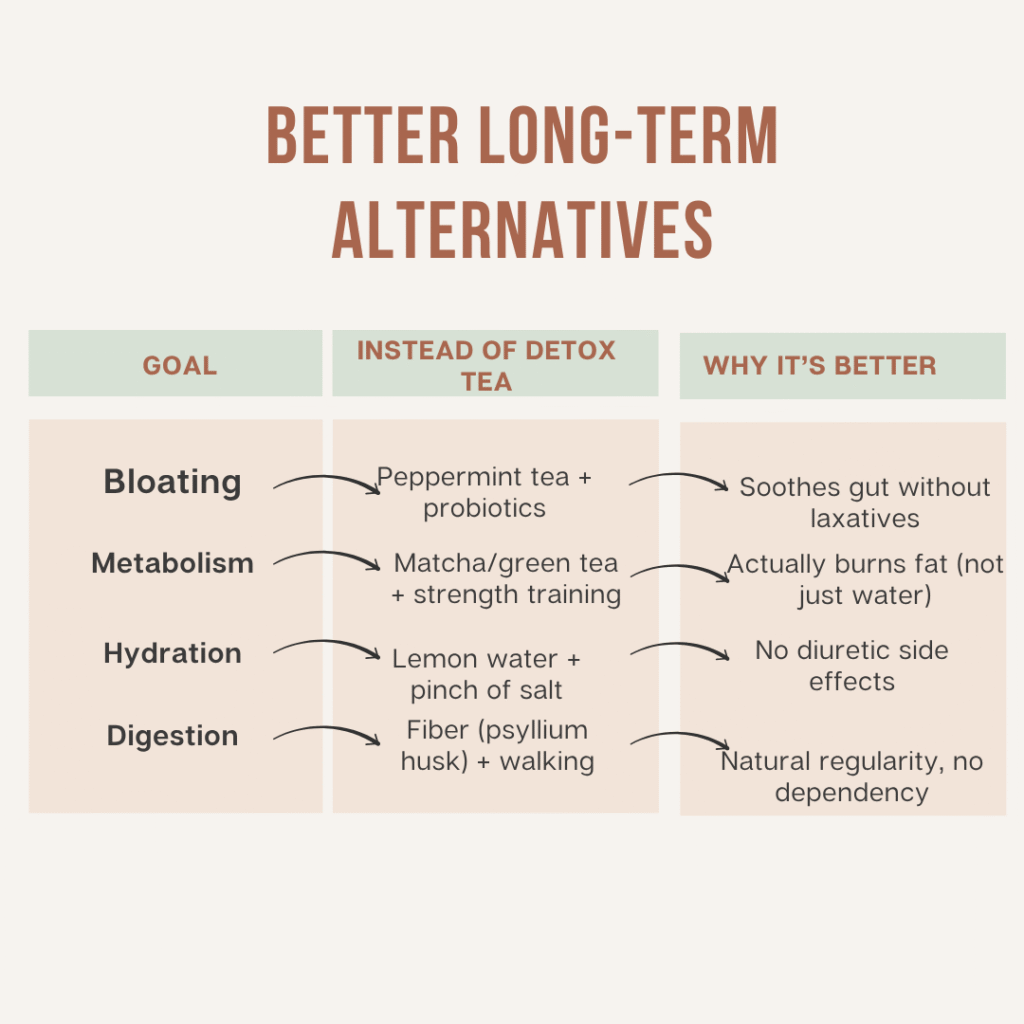
Detox tea isn’t worth the risks for weight loss. At best, it’s a placebo; at worst, it’s harmful. For real results:
- Eat protein and fibre (they keep you full and support gut health).
- Drink green tea (a mild metabolism booster without laxatives).
- Move daily (even walking helps lymphatic drainage).
Your body deserves sustainable care, not quick fixes.
12. FAQs
Can detox tea help you lose belly fat?
No—any weight loss is water, not fat. Belly fat can be reduced through a calorie deficit and regular exercise.
How fast does detox tea work?
Laxative teas may cause water loss in 1–2 days, but the results are temporary and unsafe.
What’s the safest detox tea?
Choose caffeine-free, non-laxative blends (peppermint, ginger, or dandelion root).
Top 3 Safer “Detox” Tea Alternatives
(No Laxatives, No Fake Promises)
- Traditional Medicinals Organic Dandelion Root
- Pros: Mild diuretic, supports liver health.
- Cons: Bitter taste.
- Yogi DeTox Tea (Herbal Blend)
- Pros: Ginger + liquorice for digestion.
- Cons: Contains cascara sagrada (use sparingly).
- Bigelow Benefits Lemon & Probiotics
- Pros: Gut-friendly, caffeine-free.
- Cons: Not a proper “detox.”


